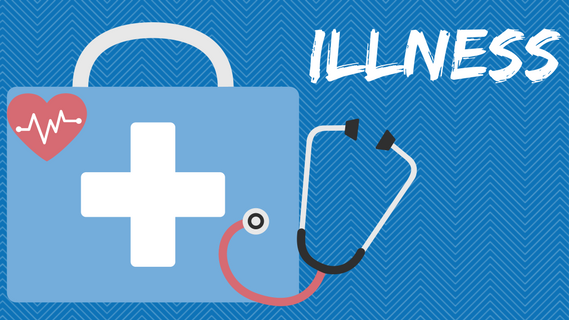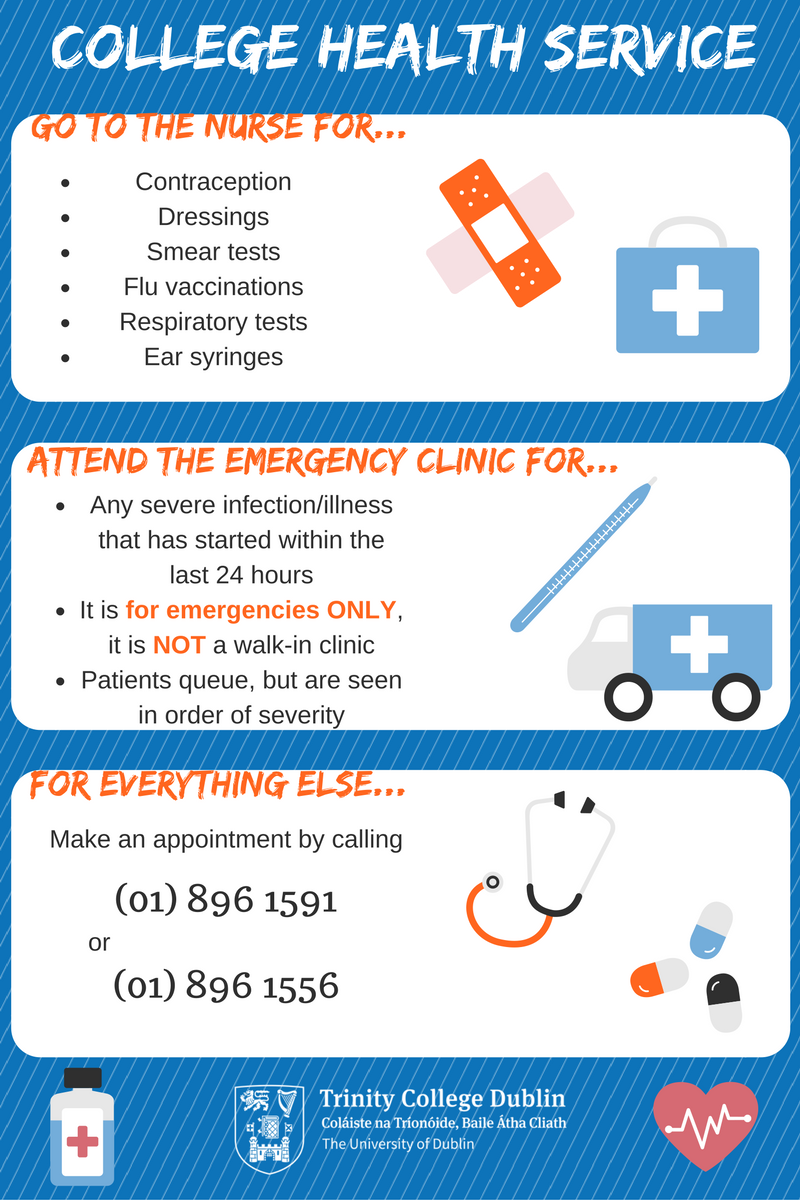January Orientation for Visiting, Erasmus & Exchange Students
Week 5 - Looking After Yourself
Food & Nutrition
Healthy Eating
Some basic tips on how to eat healthy from SafeFood here.
- Eat plenty of fruit and vegetables – They are packed with nutrients and help to reduce your risk of developing certain health conditions. Try have 5 portions a day and your body will thank you for it!
- Eat plenty of starchy foods – These are full of energy and fibre. Whole grain varieties are best and examples include rice, pasta, potatoes and bread.
- Eat protein-rich foods – Important for development and growth. Sources include poultry, red meat, fish, eggs, beans and lentils.
- Get your omega-3 fatty acids – These are found in oily fish like salmon and mackerel, nuts and seeds, and are important for keeping your heart healthy.
- Get your daily dairy intake - This is really important for students as it’s a source of calcium, which contributes to the development of healthy bones and teeth. Food like milk, yoghurts and cheese are all sources of dairy but try choose low-fat varieties as they are kinder on the ol’ waistline.
- Don’t skip breakfast – Breakfast is so important. Not only will it keep you full during those early morning lectures, but it also kick-starts your metabolism. My go-to breakfast is a bowl of porridge topped with fruit and nuts.
- Cut down on saturated fat and salt – It’s ok to have a takeaway every once in a while but usually they’re full of saturated fat and salt so it’s important to know the facts about which to choose and which to avoid.
- Cut down on sugar and caffeine and drink plenty of water – Drinking fizzy drinks, energy drinks, and eating sweets and treats affect your teeth and will leave your energy level yo-yoing. Avoid energy drinks and fizzy drinks and stay hydrated and alert by drinking plenty of water.
What to buy
No matter what your tastes, having certain (cheap!) things in your cupboard/fridge/freezer will allow you to make any number of different meals. Keep your cupboard stocked and buy fresh food weekly when you need it. Find your local butcher and see if they do student deals on meat, you can freeze meat for up to 6 months. Just leave it in the fridge the night before you want to use it.
Cupboard
- Cooking oil
- Pasta
- Rice
- Tinned tomatoes
- Beans (baked and kidney)
- Soup - cans & cup-a-soup
- Tuna
- Salt & Pepper
- Onion & garlic
- Soy Sauce
- Coconut milk
- Potatoes
- Chilli flakes or powder
- Mixed Herbs
- Stock cubes - vegetable or chicken if you're only buying one type
- Curry powder or paste
- Tea & coffee
- Porridge
- Sugar
Fresh food
- Butter
- Milk
- Eggs
- Vegetables
- Fruit
- Meat - if desired
- Cheese
- Bread
Frozen Food
- Vegetables - peas/mixtures
- Potatoes - waffles, chips, wedges
What to cook and how to cook it
The ingredients above will give you the base to make a wide variety of meals, but you also need to know what to do with them! Follow the links below to some basic recipes for students, that will ease you into cooking healthy meals for yourself and when you've gained some confidence there branch out and browse online for thousands more. You'll also need some basic cooking implements:
- A non-stick frying pan - never use metal implements or scourers on a non-stick pan
- A pot
- A spatula - plastic so it doesn't ruin the non-stick pan
- A large spoon - plastic or wooden
- A few good sharp knives for chopping
- A chopping board

Illness

College Health Centre
Trinity has a full health centre available to students, including doctors, nurses, a physiotherapist and a psychiatrist. Visits to the doctor and nurses are free, but there may be some charges for certain services, for example travel vaccinations. There is a fee of €20 to visit the physiotherapist.

Student Emergency Clinics
If you have a health emergency, such as severe or infectious symptoms in the last 24 hours you can attend the emergency clinics every day at 9am and 2pm. Students are seen by severity of condition which is assessed by the nurses. This is not a walk-in clinic. It is only to be used for emergencies, for all other cases, please make an appointment
Missing college through illness
There will be times when you will need to stay home because of illness. Students can self-certify for 3 days, and after that you will need a doctor's note. If you need to miss a tutorial or a seminar, let your instructor know. If you are too ill to complete an assignment on time you should talk to your Tutor and your instructor rather than just letting the deadline pass. Make sure you have someone in your class who you can ask about what you missed if you were sick.
Your Mental Health
What is mental health?
When we talk about mental health, we’re talking about how we feel, how we relate to other people and how we do day-to-day things. It' not just the absence of a mental health problem, having good mental health is about feeling good about ourselves and being able to get on effectively in daily life.
A person’s mental health can be positive and good, or it can be poor and people can feel down and unwell. Either way, it’s important to know the quality of a person’s mental health isn’t fixed. It can get better or worse at different times as we journey through life. Even day-to-day experiences can affect our mental health for better or for worse.
We can all experience tough times when we feel stressed, upset, worried or afraid. We consider it a ‘mental health problem’ when our feelings, thoughts or beliefs negatively affect our day-to-day lives and activities and we cannot seem to, or don’t know how to, move past those feelings, thoughts or beliefs. It’s at times like this that we can use a hand or extra support.
ReachOut.ieMinding your mental health
You should take care of your mental health like you take care of your physical health, and, like your physical health sometimes your mental health will be well, and sometimes not-so-well.
- Exercise
- There are many advantages to exercising. It helps increase energy levels, use up excess energy and can improve sleep patterns and fitness.
It also helps to manage stress and anger and can boost your confidence. All positive for your mental health. - Nutrition
- Having a balanced diet can help with energy levels, weight control and self-esteem.
It’s easy to fall into bad habits, but is important to try and eat well and cut out junk food. - Relax
- It’s very easy to overlook making time for yourself with the hectic pace of life we all lead.
It’s essential for your mental health that you find ways to take time out and relax. We all have different things we find relaxing; what we do isn’t as important as actually doing it. - Sleep
- Sleep is crucial to our physical and mental health. It re-energises us, helps our bodies to heal and keeps our memory working properly.
There are many things you can do to improve your quality of sleep including exercise, avoiding stimulants and implementing a daily routine or bed-time. - Be mindful
- Mindfulness is about learning to focus your attention on the present moment. Not worrying unduly about past or future problems can be hugely beneficial to your physical and mental health.
It can steady the breath, heart-rate, and improve the immune system and can help to deal with anxiety and depression.
- Mindfulness is about learning to focus your attention on the present moment. Not worrying unduly about past or future problems can be hugely beneficial to your physical and mental health.
- Self-talk
- Training the inner-voice in our head can be difficult, but worth-while. It’s important to learn not to talk to yourself in a negative or destructive way, such as thinking in black and white or constantly comparing yourself to others.
- Set goals
- Setting realistic goals, prioritising what’s important, and balancing our time can help in the management of our mental health. It gives us perspective on things and enables us to deal with problems more effectively.
- Work on your self-esteem
- Improving our self-esteem might seem like a constant battle, but it’s necessary in order to manage our mental health.
Challenging negative thinking, accepting yourself and not comparing yourself to others will help to develop your self-confidence.
- Improving our self-esteem might seem like a constant battle, but it’s necessary in order to manage our mental health.
- Talk
- Sometimes sharing things with friends and family can help you through and tough time, by helping you get some perspective.
Not only that, but staying connected and being social, anything from going to the movies or meeting people for a coffee, goes a long way to looking after your mental health.
- Sometimes sharing things with friends and family can help you through and tough time, by helping you get some perspective.
WorkOut app
WorkOut is a mental fitness phone app. It helps you work on problem-solving, goal setting, making time for things you enjoy, identifying your strengths and lots more.
It’s based on the principles of cognitive behavioural therapy. Cognitive behavioural therapy is a practical action-oriented approach to moving past negative thinking which can impact our mood and outlook.
The Wellness Workshop
The Wellness Workshop is an online workshop for anyone to help either maintain or improve their mental health.
The Wellness WorkshopStress
What is stress?
Stress is how you feel when you are facing demands that you are not sure you can meet. It is a normal part of everyday life and can be both positive and negative. Many things can trigger a stress response - relationships, money, work, exams, the expectation you put on yourself or the expectation you feel from others – the list is endless.
Stress can affect how you feel; how you think and behave; how confident you feel; and your energy levels. A small amount of stress can be healthy as it can motivate us and help prepare us for challenges in life. However, when this balance tips into high stress levels it can cause you to feel unwell. It is very difficult to measure stress levels as different people react to events in their lives in different ways – so what you find stressful may be motivating for someone else.
How to recognise stress
Stress symptoms will be different for different people it is important that you develop a picture of what you feel like when you are stressed. This will help you to recognise the symptoms of stress early, so that you can find ways of reducing stress. Recognising and managing stress early will help prevent it leading to more serious problems such as anxiety, depression or high blood pressure. Some common symptoms of stress are listed here
- Rapid heartbeat
- Tense muscles
- Headaches
- Feeling irritated/agitated
- Sleeping problems
- Breathlessness
- Sweating
- Loss of appetite
- Upset stomach
- Difficulty concentrating
- Racing thoughts
How to Manage Stress
Coping resources can broadly be divided into cognitive coping strategies and physical coping strategies. Some of these coping strategies will suit some people, others will not. The key is to have a range of resources that can be applied, depending upon the situation and the individual. Furthermore, it is important to have strategies one is comfortable using.
Cognitive Behavioural Strategies
These refer to ways of dealing with stress using our minds. Cognitive coping strategies are a good way to combat stress-producing thoughts. As Shakespeare’s Hamlet said, “. . . for there is nothing either good or bad but thinking makes it so. . .” Examples of these strategies are:
- Reframing – focus on the good not the bad; think in terms of wants instead of shoulds. It’s best if our thinking is related to our goals. For example, “I want to read and understand this chapter in Chemistry so I do well in my lab practical” instead of “I have to read this difficult chapter in Chemistry”.
- Challenging negative thinking – stopping the negative thoughts we may have about a situation or ourselves. Examples of negative thoughts include expecting failure, putting yourself down, feelings of inadequacy - a thought such as “Everyone else seems to understand this except me.”
In order to gain control of negative thoughts or worries, you must first become aware of them. Next, yell “Stop!” to yourself when they occur. Try replacing with positive affirmations or at least challenge or question any irrationality of the thoughts.
- Positive self-talk – using positive language and statements to ourselves. These are sometimes referred to as positive affirmations; they are useful for building confidence and challenging negative thoughts. For example, “I can do this or understand this” or “I’ll try my best”. These work best when they are realistic and tailored to your needs and goals.
- Count to ten – this allows you time to gain control and perhaps rethink the situation or come up with a better coping strategy.
- Cost-benefit analysis – Is it helping me to get things done when I think this way?
- Keeping perspective – when under stress it is easy to lose perspective; things can seem insurmountable. Some questions to ask yourself: Is this really a problem? Is this a problem anyone else has had? Can I prioritise the problems? Does it really matter? “Look on the bright side of life!” - Cultivate optimism.
- Reducing uncertainty – seek any information or clarification you may require to reduce the uncertainty. It helps to ask in a positive way. Situations that are difficult to classify, are obscure or have multiple meanings can create stress.
- Using imagery/visualisation –imagining yourself in a pleasant or a successful situation to help reduce stress. One way to use imagery is as a relaxation tool; try to remember the pleasure of an experience you’ve had or a place you’ve been. The more senses you involve in the image the more realistic, therefore the more powerful. This strategy is often combined with deep breathing or relaxation exercises.
Behavioural Coping Strategies
These refer to ways of dealing with stress by doing something or taking action to reduce the stress experienced. Examples of these strategies are:
- Physical exercise – aerobic exercise is the most beneficial for reducing stress. It releases neurochemicals in the brain that aid concentration. For some people, even a short walk is sufficient to relieve stress.
- Relaxation – from simple relaxation such as dropping the head forward and rolling it gently from side to side or simply stretching, to more complex progressive relaxation exercises. Progressive relaxation involves tensing and releasing isolated muscle groups until muscles are relaxed. Try the Student Counselling Service's Mindfulness podcast.
- Breathing – from simple deep breaths to more complex breathing exercises related to relaxation and meditation.
- Smile and Laugh - gives us energy and helps to lighten the load; relaxes muscles in the face.
- Time management – specific strategies such as clarifying priorities, setting goals, evaluating how time is spent, developing an action plan, overcoming procrastination and organising time. These help us to cope with the numerous demands placed upon us, often a source of stress.
- Social Support/Friends – encourage the development and nurturing of relationships.
- Seek Help – to help us cope with unmanageable stress. Supports in college include the Student Health Centre, Student Counselling Service, College Tutors and Chaplains.
SilverCloud 'Space from Stress'
Silver Cloud is a computer-based system offering online programmes that target specific problems common to students. Students who use Silver Cloud are assigned a counsellor (from the Student Counselling Service) who ‘checks in’ online about once a week and gives extra help if needed. The programmes take 6-8 weeks to complete, and include both information and practical advice/exercises.
'Space from Stress' deals with the symptoms and causes of stress in student life
SilverCloud
